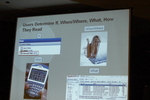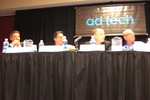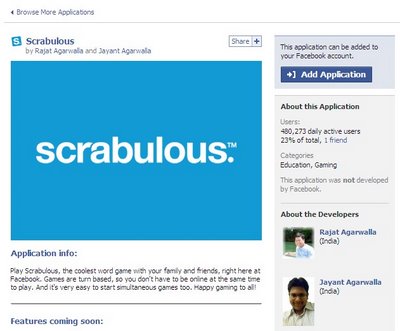
While "
The Role of Email in a Web 3.0 World" was mostly theory, I liked its feel-good flow. Moderator Christopher Marriott of Acxiom Digital got panelists comfortable without making viewers feel like they were sitting on the outside of an inside joke. It's a rare and beautiful skill.
Marriott acknowledged it was late in the day and told us up-front that the panelists were debriefed on his questions beforehand. As a result, he said, they came laden with slides to answer three major questions:
1. How might the nature of email change as it goes more completely cross-platform?
2. Can email coexist with the semantic web (web 3.0) ... or co-opt it?
3. What role will The Consumer play in creating web 3.0 email?
Before we get too deep down the rabbit hole, let's define web 3.0.

Web 1.0 was pure information-gathering. People used it to answer data- or fact-oriented questions like, "How are the White Sox doing today?"
Web 2.0 wedded information-gathering to collaboration. Today, the 'net answers two questions: "How are the White Sox doing?
And what do my friends think about how the White Sox are doing?"The theory behind Web 3.0 -- the so-called
Semantic Web -- is that the 'net won't just be a place for interacting with friends and colleagues. The web itself will interact with you, learning what you want, who you are, and what you are likely to do in the future.
So even before you ask the question, Almighty Internets will turn to you and say, "THIS is how the White Sox are doing. By the way, you've won some cash in the office pool. Oh, and yes, Bob does think you're fat." (Okay, it won't
quite be this way. But you get the idea.)
Web 3.0 will know
your intent when you interact with it -- a concept Google grapples with as it seeks to evolve beyond contextual advertising, and that wannabe-rivals -- like Powerset and Cuil -- claim to have already mastered.
Hokay. So what does any of this have to do with email?
Email is a relic of the old guard. While web 2.0 is mostly a "pull" agent -- that is, your friends know what you're doing based on what your Facebook status proclaims -- email marketing operates under the traditional "push" model -- i.e., if you want your friends to know what you're up to, you must mass-mail each one of them.
(As an aside, Google's Gmail is helping put email into "pull" mode. Gchat, a chat box inside Gmail, enables users to broadcast status messages, a la Facebook, to email buddies. Of late, I'm using a lot less AIM and a lot more Twitter + Gchat.)
A few facts for the changing face of email:
 Users under 24 don't use email the way those over 24 do.
Users under 24 don't use email the way those over 24 do. Teens are more likely to text or hit Facebook than they are to shoot a two-line message through an email client.
But
email's not drifting into obsolescence; its perceived role in the user's life is only changing. For me, getting a message across to friends is all about speed and efficiency. I can broadcast one message on Facebook or Twitter and ensure everyone who needs to know about it will get it right away -- increasingly via mobile as smart phone-based apps for FB and Twitter grow more common.
There's a certain formality to email that's lacking in quicker communications. When I shoot an email to a new colleague, I read it carefully in hopes of creating the most favorable impression. And that's a common sentiment: as the "Facebook generation" (users 18-24, 10 percent of the population) invades the workforce, they look at email as a skill crucial to mastering in the career environment.
There's also a benefit to the response delay inherent to email. If my boss -- or hell, a PR person -- texts me with an unsavory (but often necessary) gig, they'll probably think they're being ignored if I don't answer ASAP. But if they send me a message via email?
Heeeey. I can mull for awhile, consider my options, provide a thoughtful response after maybe a few hours or -- just between us! -- even wait a day. People don't assume you'll read an email instantly.
And as Lauren McDonald of Silverpop pointed out, email remains a superior medium for certain types of communications. Flight alerts are preferred via email rather than via text-message. And here's some exciting news: as smartphone sales increase (7.3 million sold in North America, 1Q08!), the likelihood of a user being exposed to an email more than once goes up: studies show that over 80 percent of those that read email from mobile devices also read them on PCs.
Unfortunately,
current email marketing standards are pretty primitive. This is something that'll have to change as we approach the hype-ridden and glorious Web 3.0. Quoting a JupiterResearch study, Ryan Deutsch of StrongMail said many companies send out radically different streams of email
to the same customer. If Web 2.0's taught us anything, it's that people want to be addressed as individuals, not as your "Dear Valued Customer." Panelists encouraged listeners to explore customers on a ridiculously personal -- slightly stalkerish? -- level: Who's your most frequent buyer? What flowers does she like? Does she have kids?
Target her with a consistent message, preferably one tailored to her sensibilities.
But that's 2.0 best practices. Practically the stuff of yesterday. Matt Wise of Q Interactive expanded on the hypothetical role of email in Web 3.0 in a manner most HAL.
At best, email 2.0 uses the past to determine the likelihood of future patronage.
This person visited a baby site. Therefore this person is likely to want diapers. Wise calls this method "tremendously wasteful."

In 3.0, Wise says, we'll be able to
predict future purchasing actions WITHOUT consulting a user's past:
They've never been to a baby site, but I predict they'll want diapers based on some kind of algorithm that I can't even wrap my brain around yet.
And while there's little we can do now to divine who'll love us tomorrow, people in the background are already working on making it a possibility.
Your emails are being read. Your code is being deciphered. There's facial recognition, heat mapping stuff, going on out there to try targeting advertising to you. For those anticipating tomorrow's online marketing environment, panelists stressed the following message again and again:
when pushing email, think about when a user will receive it, where s/he'll likely read it, and why they'll want to open it.A simple enough mantra for the bathroom mirror.
At the end of the sesh, a woman who represents a cadre of freelance photographers asked whether it's more valuable for her clients to push their email marketing messages with images or text.
"Use both," McDonald advised. The image is good, but describe it too. The latter will prove particularly helpful if recipients check the email from a phone. Many can't render images yet, but that's changing.



















